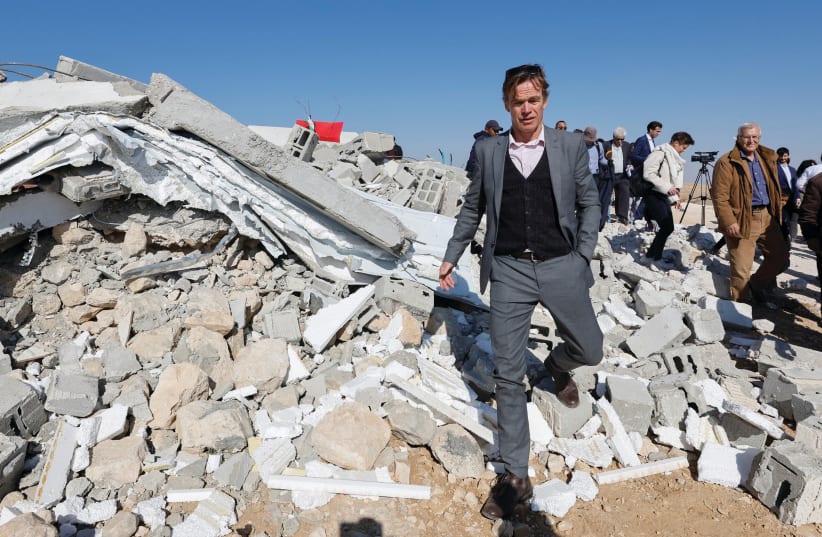According to a European Union leaked document, it is planning to help the Palestinians take over Area C while it has always claimed to maintain an evenhanded position based on law. What’s perceived as deception has led to a harsh response from Israel’s Knesset members.
Per the Oslo preliminary accords, the West Bank was divided into three parts: Areas A, B and C. Israel retains jurisdiction in Area C with regard to security, public order and all issues related to the territory, including planning and zoning.
Needless to say, anything related to that area is a highly sensitive matter to all, especially to Israelis when their rights in the area are being questioned, when criticism comes from the EU and when it puts into question some of the EU’s own values and laws.
Let's look at context
In order to comprehend what has transpired with the document and Israel’s reaction, it’s important to look into the context: the EU has strived to remain a neutral power as it states its opinion (read criticism) on Israel’s policies in the West Bank. It insists that its positions are based on meticulous compliance with international law, EU law and charter, and also the Oslo Accords.
This claim is surely defied by the leaked document in which we can see an activist EU striving to help the Palestinians take over Area C, the very area that is designated to Israel’s control per the Oslo Accords preliminary agreement which the EU claims to uphold.


To Israelis, the jig is up and the deception has been uncovered. One cannot blame the EU for things it hasn’t said or done but the leaked document proves the EU has been trying to circumvent the laws it is asking everyone else to follow.
The EU insists that Israel should abide by the Oslo Accords, as it still believes that within this area, a Palestinian state should be established within the framework of a comprehensive peace agreement. At the same time, according to the leaked document, it tries to strip Israel of its rights per that same agreement.
So that’s where humanitarian law comes in; the very set of laws that are supposed to help the EU circumvent Israel’s authority in Area C. This means that the EU has found a way to fund construction in Area C without violating the Oslo Accords, or so we are tricked to believe. The claim is that the construction is meant for humanitarian ends and is not politically motivated. Yet the EU construction takes place in locations that are highly sensitive, precisely for the sole purpose of creating new facts on the ground and preparing the area for a Palestinian takeover without any final peace agreement.
Many times the political motivation is obvious, as the construction is conducted without permits and in such places where Israel has no choice but to demolish it, for example, a school adjacent to a dangerous highway or other construction in places where there are no facilities and thus are not considered habitable environments. The political motivation becomes even more obvious when the document explicitly states the EU’s plan to curb Israel’s archeological activities in order to minimize the Jewish connection to the land.
Moreover, the EU does not seem to consider building in Area A and Area B where all they would need is a permit from the Palestinian Authority. Apparently, in those areas, there is no need for humanitarian aid at all.
Needless to say, the news of the leaked document hit Israel really hard. Subsequently, a letter signed by 40 Knesset members was sent to EU leaders.
The letter, initiated by Likud MK Amichai Chikli, reminds the EU of Europe’s past when it used to taunt Jews to “go to Palestine,” and now, in essence, claims that Jews are foreigners in their own homeland.
The letter continues to state that the leaked document “completely ignores our people’s historical affinity to our homeland and completely ignores the status of the State of Israel in Area C.” Furthermore, the letter points out that no nation turns its back on its own heritage and reminds the EU that we have not forgotten our history.
Finally, the letter ends by calling upon the EU to immediately cease its illegal construction, halt the damage being caused to heritage sites and the nature in Judea and Samaria, and immediately desist from funding delegitimizing organizations that promote antisemitic propaganda, including Israeli organizations that serve EU interests.
The letter is, in fact, a fitting response to the leaked document and the reasons are twofold. For one, the EU has no jurisdiction in any of those areas and secondly, it has clearly misused humanitarian law and thus violated international law in broad daylight.
Now that the EU’s intentions are exposed, it should reconsider its positions, stop masking its political positions with laws and put its cards on the table for an honest discussion that is, in reality, a political and moral debate and not primarily about the law. They should do that before EU-Israel relations deteriorate any further.
As for Israel, it should invest more time and energy in defending its rights and preempt such initiatives, whether it comes from the EU, the United Nations or elsewhere.
The writer is the director of Golden Gate Public Affairs, advising on EU-Israel affairs and working with European Union institutions in Brussels.
